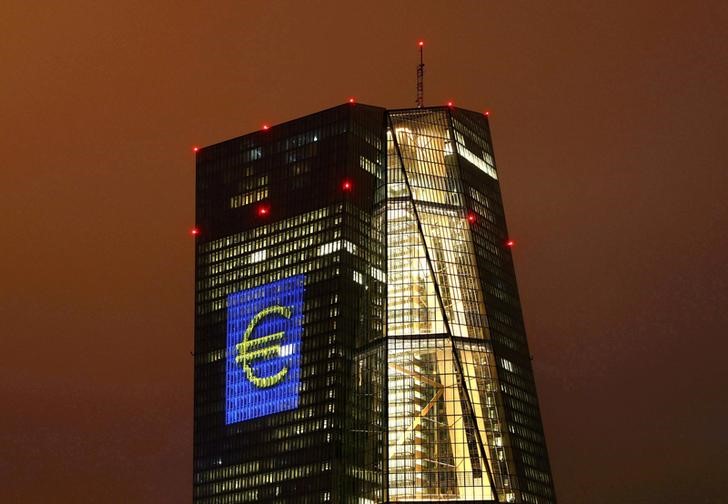By Balazs Koranyi and Francesco Canepa
FRANKFURT (Reuters) - The European Central Bank will extend its already generous asset buys on Thursday, aiming to boost stubbornly weak price growth, but with much of its firepower exhausted it may also debate sending a token signal about the eventual end of such purchases.
Emphasising abundant risk, including from elections in potentially four of the euro zone's five biggest economies, ECB President Mario Draghi is expected to argue that premature tapering - or slowly ending - bond-buying could abort a still timid recovery, unravelling the impact of the buys.
The unprecedented effort has already consumed 1.4 trillion euros (£1.2 trillion).
Indeed, the ECB has been at pains in the past month to emphasise that maintaining current financing conditions is 'crucial' as underlying inflation seems to be stuck below 1 percent, a message taken by markets as confirmation of their expectation for a six month extension of asset buys until September.
The ECB will announce its key policy decisions at 1245 GMT, followed by Draghi's news conference at 1330 GMT.
On the face of it, the outlook is upbeat. Inflation - which has been dangerously low - is now at a more than 2 year high and rising, with higher oil prices and predictions for more U.S. budget spending bolstering expectations.
Euro zone economic growth is shrugging off Britain's decision to leave the European Union, and Germany, the bloc's growth engine, seems to be picking up speed again.
Ironically, the collapse of Italy's government this week may actually hasten instead of delay the recapitalisation of ailing lender Monte dei Paschi (MI:BMPS), much to the ECB's relief, It has pointed to weak banks as a key obstacle to transmitting stimulus.
Italian bank shares (FTIT8300) are up over 10 percent this week and the sovereign bond yield differential between Germany and peripheral countries like Italy and Spain have narrowed since Sunday's vote.
WEAK OUTLOOK
But beneath the surface, the outlook is far from comforting.
The inflation rise is almost entirely due to past oil price falls being knocked out of statistics and underlying inflation is flat, if not slowing, suggesting that price growth is far from sustainable, a key condition for removing stimulus.
Wage growth has also disappointed, suggesting that companies have cut their inflation expectations. This is a hard-to-break cycle that could entrench anaemic price growth, making it tougher to get it back to the desired at-or-just-below 2 percent.
Even consumption, the key driver of growth is not as good as it looks. Consumption has been driven a jump in disposable income due to oil price falls and loose ECB policy. But Brent crude (LCOc1) is up 14 percent in the past 3 months, leaving monetary policy as the chief driver of consumption.
"Core inflation and wage growth remain stubbornly low, and the ECB will be wary of repeating past mistakes of withdrawing support too early," HSBC said in a note to clients. "Perhaps as important are the numerous political risks."
The rising clout of populist parties could also weaken governments' resolve to push ahead with painful but needed reforms. Elections in France, Germany, the Netherlands and possibly Italy, could leave the ECB with more of the burden.
Even though many of the ECB's fresh economic forecasts will be broadly unchanged from three months ago, the projection for underlying inflation is likely to be cut, a vital clue that the rise in inflation may be temporary.
SCARCITY
One key problem for the ECB to solve then is how to find enough assets to buy. Self imposed rules are creating a scarcity and the ECB will have to ease some restrictions, though each move will come with a cost, raising political and legal challenges.
The options on the table will be whether to buy bonds yielding less than the deposit rate, buy more than 33 percent of each bond or whether to deviate from the so-called capital key, or each country's shareholding in the ECB.
"We expect the ECB to remove the deposit rate floor and potentially allow for some limited deviation from the capital-key allocation," BNP Paribas (PA:BNPP) said.
"Even so, asset scarcity would still be biting. The ECB faces a trade-off between the volume of its monthly purchases and the length of the QE programme."
Another debate will be whether to send markets a signal about the eventual end of the asset buys.

Although such a signal is far from certain, policymakers are still likely to debate it, a potential concession to more conservative policymakers and an acknowledgement that the programme, nearing the end of its second year, cannot go on indefinitely.